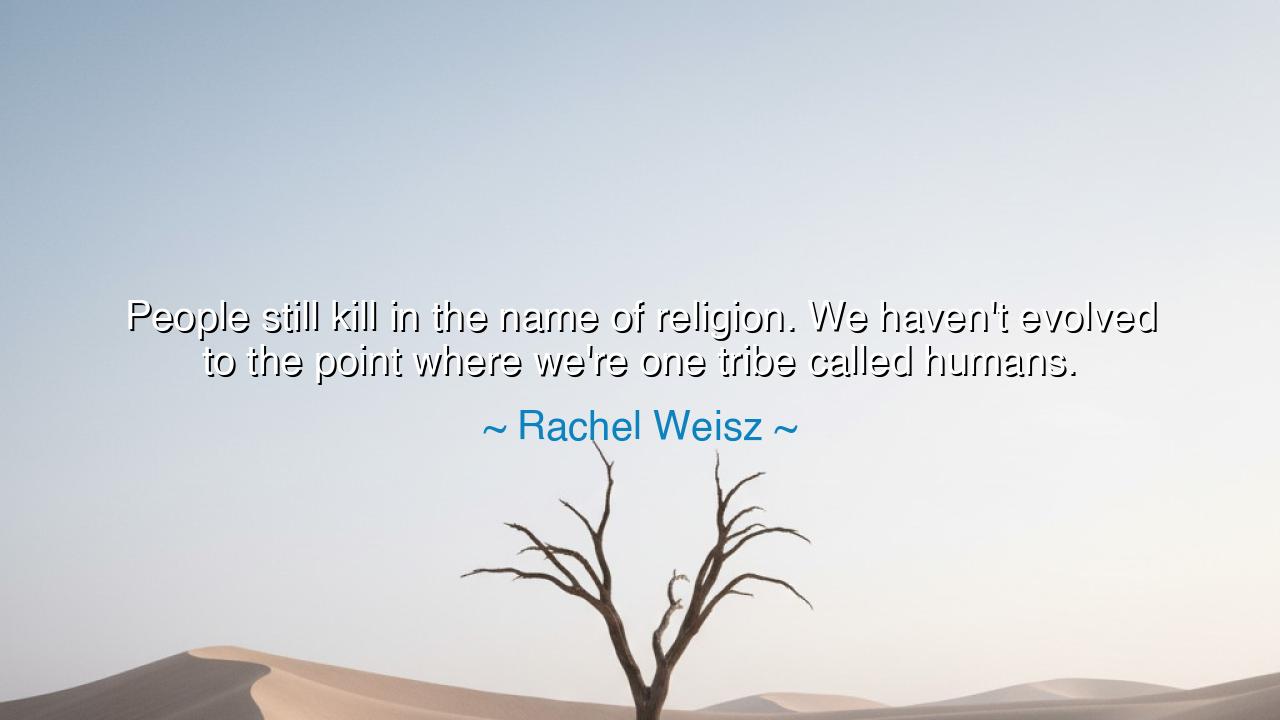
People still kill in the name of religion. We haven't evolved to
People still kill in the name of religion. We haven't evolved to the point where we're one tribe called humans.






Hear, O children of the earth, the lament of Rachel Weisz: “People still kill in the name of religion. We haven't evolved to the point where we're one tribe called humans.” Her words are both sorrow and prophecy. For though centuries have passed, and though men have written laws, built temples, and studied the heavens, the shadow of division still lingers. Religion, which ought to unite hearts in reverence for the divine, has too often been twisted into a weapon, its sacred fire kindled for war instead of peace. And so humanity, fractured into tribes of creed and nation, has not yet embraced its highest calling: to live as one family under the sky.
What does it mean to kill in the name of religion? It means to take the holiest words, the most sacred prayers, and stain them with blood. History is heavy with such tragedy. The Crusades thundered across centuries, where knights rode beneath the cross, claiming to serve God while swords struck down fellow men. The Thirty Years’ War tore Europe apart, where Protestants and Catholics, both naming Christ, slaughtered each other in His name. These wars were not the will of heaven but the folly of men, mistaking tribal banners for eternal truth.
Yet the wound is not only ancient—it bleeds still in our time. Temples are bombed, mosques are burned, and worshippers are slain while kneeling in prayer. The killers claim to serve God, but in truth, they serve fear, pride, and hatred. The tribes of men, whether religious, ethnic, or national, cling to their differences, forgetting that beneath the garments of culture and creed, every soul is the same. Rachel Weisz speaks rightly: we have not yet evolved to the point of being one tribe, called simply humans.
But there have been voices of light in the darkness. Recall Mahatma Gandhi, who declared that “an eye for an eye makes the whole world blind.” Though a Hindu, he drew wisdom from the Sermon on the Mount, from the Quran, from all traditions. He showed by his life that religions need not divide; they can instead become rivers flowing into the same ocean of truth. He was struck down by violence, yet his message endures: that the path of peace lies not in exalting one creed above another, but in honoring the sacred unity of all.
The lesson is not to abandon faith, but to cleanse it of hatred. True religion does not demand blood; it demands compassion. True worship is not in conquest, but in kindness to the stranger, mercy to the poor, and reverence for life. When men kill in the name of God, they are not serving Him—they are silencing Him. The highest evolution of mankind will come when religion is no longer a wall but a bridge, when it ceases to divide tribes and begins to remind us that all are one tribe, one family, one humanity.
Practical wisdom follows: let each of us be vigilant against the voices that preach division. Let us teach our children that no faith calls for hatred, and that no difference of religion or nation is worth the price of blood. Let us seek out the common truth in every creed, the golden thread of compassion and justice that binds them together. And when others speak of enemies, let us remember: there is no enemy, only brothers and sisters not yet recognized.
So I say to you, heirs of tomorrow: live as citizens not of a tribe, but of the world. Be the generation that proves Rachel Weisz wrong—that evolves past the need for division, past the madness of killing for creed. Become the tribe of humans, united not by uniformity but by shared dignity. For only then shall swords be broken into plowshares, and only then shall peace dwell upon the earth.






AAdministratorAdministrator
Welcome, honored guests. Please leave a comment, we will respond soon